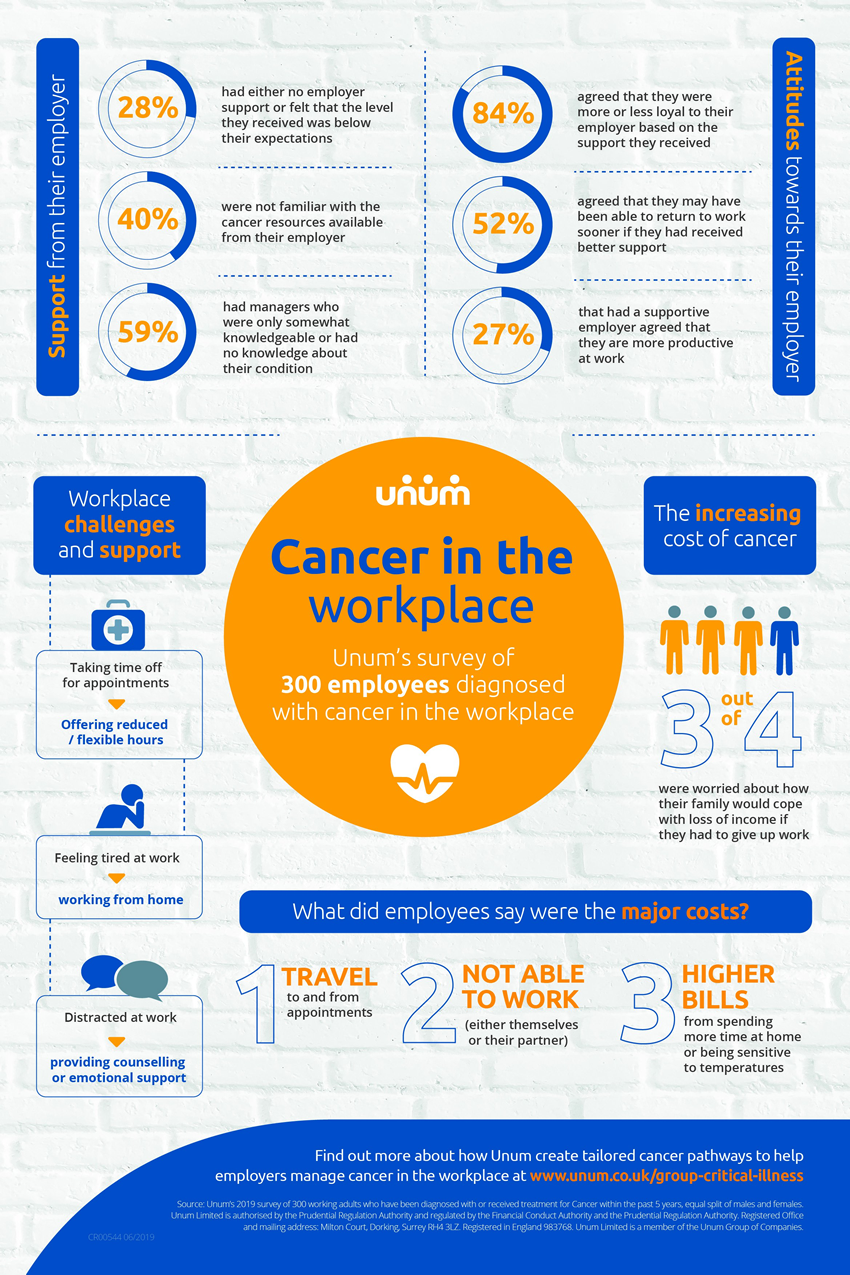The clear message is that employers could do more as over half of employees with cancer felt they may have been able to return to work sooner had they received better employer support.
In a survey of 300 UK workers diagnosed with cancer in the last five years, Unum, group risk provider, explored workers’ attitudes and challenges, as well as best practices for how employers can support their staff. The research findings reinforce the company’s shift to provide more holistic cancer support for people and their families.
This new research from Unum underpins the importance of employer support.
Employer support
More than a third (40%) of workers surveyed were unfamiliar with the resources their employer provided for cancer sufferers before they were diagnosed. Although Unum’s survey found people with cancer largely received some form of support from their employer, a little under a third (28%) said they didn’t receive any support or the support they received fell below their expectations, suggesting more can be done to support employees.
28% of workers with cancer said they didn’t receive any support or the support they did receive fell below their expectations with 84% agreeing that their loyalty towards their employer could be influenced by the amount of support received.
Workers’ attitudes
The results underpinned the importance of a supportive employer, with the large majority (84%) of respondents agreeing that the level of support they received may directly correlate to the loyalty (or disloyalty) they feel towards their employer. More than half (52%) of employees thought they may have been able to return to work sooner had they received better support from their employers.
Workers described their overall sentiment towards work as providing a sense of normalcy (32%), taking their mind off diagnosis (28%), and valuing the social connectedness that work provided (22%). Some wanted to return to work but weren’t physically able to (16%). Others were nervous to return to work (26%), felt that work was mundane (14%), or could not face work (12%).
The cost of cancer
Three out of four (74%) workers surveyed worried about the cost of cancer and how their families would cope with loss of income if they had to give up work. The major costs of cancer reported include travel, not being able to work and earn an income (either them or their caregiving spouse), and higher bills.
Challenges for employees
Receiving repetitive treatment or recovering from surgery can require time away from work and understanding from an employer. Yet, a third (32%) of respondents revealed taking time off work for appointments is one of the biggest challenges they faced.
Treatment can also be exhausting and debilitating. Just under a third (30%) of the people surveyed admitted they felt tired while at work, while 19% reported feeling distracted.
In suggesting the most valuable ways employers can help their employees through cancer, 42% of respondents said offering reduced or flexible hours, 29% appreciated the offer to work from home, and 27% felt access to counselling or emotional support was, or would be, a valuable resource. More than half (52%) of respondents thought insurance cover – either to help with loss of income from inability to work or to provide a lump sum financial benefit to help with the cost of cancer – would be beneficial.
Liz Walker, HR Director at Unum, commented: “Employees diagnosed with cancer can quickly find their world changed beyond recognition. During this highly stressful and often confusing time, work can provide an oasis of normality and routine. However, our research shows the experiences of those who choose to work through a cancer diagnosis can vary widely, and a supportive employer can make all the difference.
“Creating employee resource groups for cancer survivors for emotional support, introducing flexible hours and remote working options, or providing practical insurance cover and return-to-work support can go a long way in aiding employees in their recovery, while signaling that you care.”



